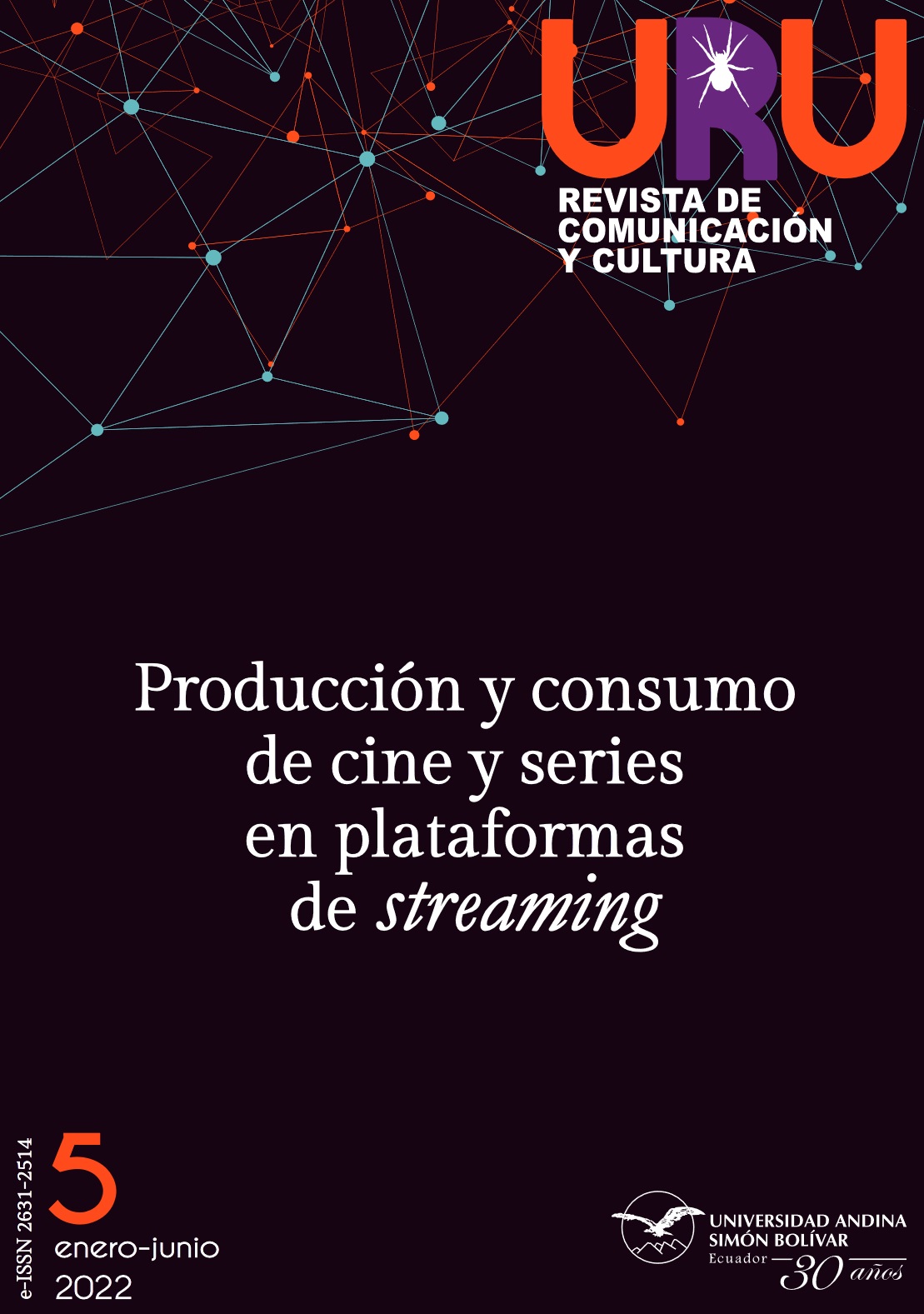The Pelucón Lexical Variant in Ecuador: A Computer-Mediated Discourse Analysis
DOI:
https://doi.org/10.32719/26312514.2022.5.10Keywords:
Discourse analysis, pelucón, Ecuador, populism, meritocracyAbstract
The article investigates the pelucón lexical variant in the Ecuadorian context, based on the methodology called computer-mediated discourse analysis. More than thirty web pages in which the variant appeared, and which were published between 2007 and 2020, were analyzed in order to identify their predominant meanings, and then an analysis was carried out from pragmatics, discourse analysis and studies of populism. It is concluded that there are two dominant meanings in the network: the rhetoric of discord and the rhetoric of meritocracy. The first seeks to open a communicative conflict with the elites, while establishing an identity horizon with disadvantaged groups. The second is the response of the wealthy or conservative groups, when they feel questioned by the pointing out of the lack of legitimacy of their status.
Downloads
References
Almeida, José. 1996. “Racismo e identidad: Fundamentos del racismo ecuatoriano”. Ecuador Debate 38: 55-71.
Arias Icaza, A. 2007. “Aprendamos a ser todos pelucones ejemplares”. El Universo. 14 de agosto.
Banco Mundial. 2020. “Índice de Gini - Ecuador”. Banco Mundial.
Bernal, María. 2008. “¿Insultan los insultos? Descortesía auténtica vs. descortesía no auténtica en español coloquial”. Pragmatics 18: 775-802.
Bernecker, Walther, y Rüdiger Zoller. 2007. “¿Transformaciones políticas y sociales a través de élites? Algunas reflexiones sobre casos latinoamericanos”. En Élites en América Latina, editado por Peter
Birle, Wilhelm Hofmeister, Günther Maihold y Barbara Potthast, 31-51. Madrid: Iberoamericana.
Borja, Rodrigo. 2018. “Pelucón”. Enciclopedia de la Política. 16 de julio.
Bourdieu, Pierre. 1986. “The Forms of Capital”. En Handbook of Theory and Research for the Sociology of Education, editado por J. Richardson, 241-58. Westport (CT), US: Greenwood.
Brown, Penelope, y Stephen Levinson. 1987. Politeness: Some Universals in Language Usage. Cambridge (MA), US: Cambridge University Press. DOI: https://doi.org/10.1017/CBO9780511813085
Bucaram, Abdalá. 2011. “Discurso de Abdalá Bucaram, 1996”. Video de YouTube.
CEPAL. 2017. “La elevada desigualdad en América Latina constituye un obstáculo para el desarrollo sostenible”. CEPAL. 30 de mayo.
Colin, Marisela. 2003. “El insulto: Estudio pragmático-textual y representación lexicográfica”. Tesis doctoral, Universitat Pompeu Fabra, Barcelona, España.
Correa, Rafael. 2011. Discurso del presidente de la República del Ecuador, Rafael Correa Delgado, en la ceremonia de inauguración de las Jornadas de Participación Ciudadana. Quito: Presidencia de la República.
Domínguez, Silvia. 2004. “Estrategias de movilidad social: El desarrollo de redes para el progreso personal”. Araucaria. Revista lberomaericana de Filosofía, Política y Humanidades 12: 92-128. DOI: https://doi.org/10.5565/rev/redes.58
Errejón, Íñigo. 2015. Construir pueblo: Hegemonía y radicalización de la democracia. Barcelona: Icaria.
Espinosa, Carlos. 2010. Historia del Ecuador. Quito: LEXUS Editores.
Granovetter, Mark. 1973. “The Strength of Weak Ties”. American Journal of Sociology 78 (6): 1360-80. DOI: https://doi.org/10.1086/225469
Grice, Paul. 1975. “Logic and Conversation”. En Syntax and Semantics. Volume 3: Speech Arts, editado por Peter Cole y John Kimball, 41-58. Princeton (NJ), US: Seminar Press. DOI: https://doi.org/10.1163/9789004368811_003
Guayaquil de Pie. 2007. “El significado de la palabra ‘pelucón’”. Guayaquil de Pie. 14 de noviembre.
Hardin, Jennifer. 2014. “Unsettled Elites: Reproducing the Hacendado in Neoliberal Ecuador”. Tesis doctoral, University of Illinois at Urbana-Champaign, Estados Unidos.
Herring, Susan. 2004. “Computer-Mediated Discourse Analysis: An Approach to Researching Online Behavior”. En Designing for Virtual Communities in the Service of Learning, editado por Sasha Barab, Rob Kling y James Gray, 338-76. Cambridge (MA), US: Cambridge University Press. DOI: https://doi.org/10.1017/CBO9780511805080.016
Jones, Rodney, Alice Chik, y Christoph Hafner. 2015. Discourse and Digital Practices: Doing Discourse Analysis in the Digital Age. Londres: Routledge. DOI: https://doi.org/10.4324/9781315726465
Kosol, Jonathan. 2006. The Shame of the Nation: The Restoration of Apartheid Schooling in America. Nueva York: Crown.
Laclau, Ernesto. 2009. “Populismo: ¿Qué nos dice el nombre?”. En El populismo como espejo de la democracia, compilado por Francisco Panizza, 51-70. Buenos Aires: Fondo de Cultura Económica.
Levitsky, Steven, y James Loxton. 2013. “Populism and Competitive Authoritarianism in the Andes”. Democratization 20 (1): 107-136. DOI: https://doi.org/10.1080/13510347.2013.738864
Lin, Nan, y Bonnie Erickson. 2008. Social Capital: An International Research Program. Nueva York: Oxford University Press.
Littler, Jo. 2018. Against Meritocracy. Nueva York: Routledge. DOI: https://doi.org/10.4324/9781315712802
McNamee, Sthepen, y Robert Miller. 2004. The Meritocracy Myth. Baltimore (MD), US: Rowman & Littlefield.
Milanovic, Branko. 2012. Los que tienen y los que no tienen: Breve y particular historia de la desigualdad global. Madrid: Alianza Editorial.
Panizza, Francisco 2002. “Discurso e instituciones en la reforma de la administración pública uruguaya”. Revista Uruguaya de Ciencia Política 13: 59-64.
Paz y Miño, Juan. 2019. “Viejos conceptos de las élites económicas”. Confirmado. 28 de octubre.
PNUD. 2019. Informe sobre Desarrollo Humano 2019. Nueva York: PNUD.
Sarmiento, Santiago. 2017. “Evolución de la desigualdad de ingresos en Ecuador, período 2007-2015”. Analítika 13 (1), 49-73.
Senplades. 2007. Plan Nacional de Desarrollo 2007-2010. Quito: Senplades.
Thurow, Lester. 1999. Building Wealth: The New Rules for Individuals, Companies and Nations in a Knowledge-Based Economy. Nueva York: Harper Collins.
Van Dijk, Teun. 2002. “Discurso y racismo”. Persona y Sociedad 16 (3): 191-205.
Van Leeuwen, Marco, Ineke Mass, y Andrew Miles, eds. 2006. Marriage Choices and Class Boundaries: Social Endogamy in History. Cambridge (MA), US: Cambridge University Press.
Weber, Max. 2001. La ética protestante y el espíritu del capitalismo. Madrid: Alianza Editorial.
Werz, Nikolaus. 2007. “Las élites y el extranjero: Herodianismo-latinoamericanismo-globalización”. En Élites en América Latina, editado por Peter Birle, Wilhelm Hofmeister, Günther Maihold y Barbara Potthast, 197-228. Madrid: Iberoamericana.
Williams, R. 1958. “Democracy or Meritocracy? A Vision of Society in A.D. 2034”. The Manchester Guardian. 30 de octubre.
Young, Michael. 1994. The Rise of Meritocracy. New Brunswick (NJ), US: Transaction Publishers.
Zanatta, Loris. 2008. “El populismo, entre religión y política: Sobre las raíces históricas del antiliberalismo en América Latina”. Estudios Interdisciplinarios de América Latina y el Caribe 19 (2): 29-44.
Downloads
Published
How to Cite
Issue
Section
License
LicenseASSIGNMENT OF RIGHTS, DECLARATION OF CONFLICT OF INTEREST AND DISSEMINATION
The authors who publish in this journal accept the following conditions:
- Authors retain copyright and grant the journal the right of first publication, with the work registered under the Creative Commons Attribution-NonCommercial-ShareAlike 4.0 License, which allows sharing, adapting and attributing the work (see: Open Access Policies).
- Authors can make other independent and additional contractual agreements for the distribution of the article published in this journal (e.g., include it in an institutional repository or publish it in a book) as long as they expressly indicate that the article was published for the first time in Uru: Revista de Comunicación y Cultura. In the case of reproduction, a note similar to the following must be included: This text was originally published in the journal Uru: Revista de Comunicación y Cultura N ° -, year of publication.
- Authors are encouraged to publish their work on the Internet (e.g. on institutional or personal pages) in the final version published by Uru: Revista de Comunicaicón y Cultura as it may lead to a wider and faster dissemination of the published work.









